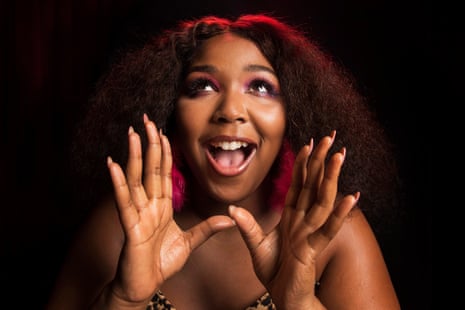Lizzo is a dab hand at getting people’s attention. Her third album, Cuz I Love You, opens with a holler that instantly pushes all the dials far into the red. “I’m crying…. cuz I love you!” she bellows, a cappella, on the title track before the band tumble in. On anyone else’s set, this dazzling outburst might be held back – the peak posture of the album’s most climactic tune.
For Lizzo, it’s just the opening gambit of a record that is unapologetically loud, bold and full-on, simultaneously old-fashioned (soul, doo-wop and romance figure) but immensely fresh in the bargain. Such saturated levels of volume and colour land as downright audacious when so much contemporary music, let alone hip-hop, currently comes in greige, narcotised hues. Or as Lizzo puts it mischievously on Tempo, her banging collaboration with obvious forebear Missy Elliott: “Slow songs, they for skinny hoes… I’m a thick bitch, I need tempo.”
On her major label debut, the woman born Melissa Jefferson sounds less like the veteran of a decade of cult-figure status, licking her wounds as she clambers up on to a hard-won bigger stage, and more like an entertainer who has always been there, fully formed, waiting for the zeitgeist to work its way round to her.
There are obvious parallels with the journey of Janelle Monáe, another multifaceted rapper turned artist whose leftfield status segued gracefully into wider renown without her core messages being toned down. Monáe got Lizzo up on stage to twerk with her at Coachella the other week (where Lizzo’s own set was marred by sound problems), and the two share similar agendas – expanding the brief for being a woman of colour in music, just for one. Monáe has a tune called I Got the Juice; Lizzo’s first proper R&B chart hit in January was called Juice, and it sets the tone for the album: positive, sassy, knowingly retro, playfully grandstanding.
Over the course of two previous albums and an EP, Coconut Oil, which marked Lizzo’s transition from indie outsider to major label asset, Jefferson became known as a whip-smart lyricist coming at hip-hop from the side. She liked to drop a little flute into her tunes (Jefferson played the instrument in her high school band; hers is reputedly called Sasha Flute, after Beyoncé’s Sasha Fierce persona).
Lizzo’s lyrical concerns roamed widely, but encapsulated the female experience: errant guys, lots of sex, not enough sex, body positive self-love – both masturbatory and more spiritual – and (as one righteous track on her debut, Lizzobangers, had it) Bus Passes and Happy Meals. In short, a little bit of everything. The styles, along with the producers, varied widely – Lizzo did backpack rapper, she did trappy, she did edgy digitals, she did straight-up flows, she did a bit of singing. Men from indie bands, rather than A-list hip-hop beatmakers, stood behind her consoles for Lizzobangers (2013) and 2015 follow-up Big Grrrl, Small World; Lizzo toured with Sleater-Kinney before opening for Haim. The unifying theme throughout was her wit and personality: she is an eye-rolling, natural comedian who landed on hip-hop as her metier.
Cuz I Love You marks a conscious desire for Lizzo to accentuate the positive, to make the biggest-sounding record a set of speakers can hold. Official production credits were unavailable for research purposes, but there are writing teams on board now.
The album does not suffer from the upgrade. There’s almost an 80s feel here – not in the musical signatures (little on the album is decade-specific; it borrows from everything from the 60s to the 90s), but in an excess of exuberance. Since Big Grrrl, Small World, and doubly so on the Coconut Oil EP, Lizzo’s songs increasingly remind you of Cyndi Lauper’s Girls Just Want to Have Fun with a 21st-century intersectional remix. The key stepping stone here is her 2016 track Good As Hell, a sisterly anthem that was part advert for hair salons, part solidarity with anyone wronged by some boy.
This is double X chromosome succour turned up to 11. Like a Girl packs couplet after couplet of mainstream-friendly female empowerment, wrapped in maximalist studio garb. Soulmate revisits one of Lizzo’s favourite themes – she doesn’t need you, she is her own soulmate; Whitney Houston’s Greatest Love of All via the gum-cracking nasal attitude of Nicki Minaj.
Emotions, and the right to express them, are also the theme of the funkified Exactly How I Feel, which features a very game Gucci Mane. The spiritually 80s vibe extends to some prancing funk-rock influences worn proudly on Cry Baby. As long ago as 2014, on his Plectrumelectrum album, Lizzo collaborated with Prince. (You can hear her on BoyTrouble; she has also guested for Bastille and Clean Bandit.)
Lizzo has spoken of keeping her singing voice under wraps for a long time, not wishing to play into the cliche of full-bodied women of colour. Now she’s singing vintage-sounding reckonings such as Jerome, fully embracing big-boned, big-lunged, highly melanated female lives being lived fully, but in a way that sells the same message of self-love and hope to entire stadiums. If this record has a downside, it is that some of Lizzo’s edge and snark has been subsumed to the programme. But really, it’s all upsides here.

Comments (…)
Sign in or create your Guardian account to join the discussion